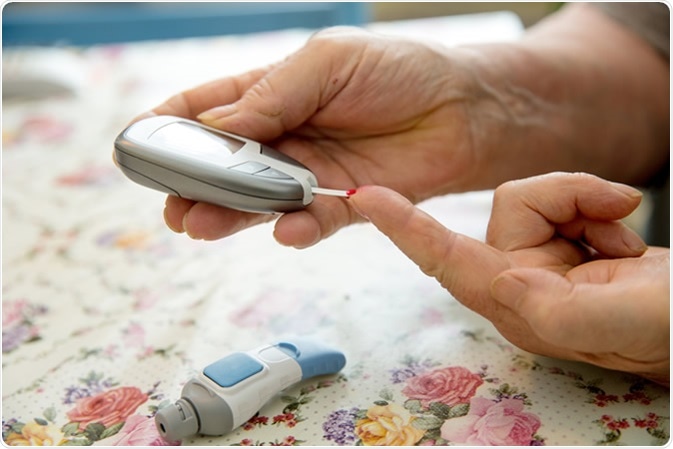What is the Keto Diet?
The keto diet is a low carbohydrate, high fat diet. Low carbohydrate and moderate protein intake results in the production of small molecules known as “ketones”. These ketones are used for energy when the body does not produce enough glucose (blood sugar).
During a keto diet, the body runs on fat and therefore burns fat all the time. This process, where the body uses fat as a fuel and produces ketones is known as ketosis. The production of ketones increases as insulin levels drop when people adhere to the keto diet.

Image Credit: Kenary820 / Shutterstock
What causes diabetes?
Normally, carbohydrates and starches are broken down by the body into glucose. Insulin helps glucose to be taken up into cells to use as a source of energy. A further role of insulin is to inhibit the production of sugar in the liver. However, if the glucose levels in the blood are higher than normal, it can lead to diabetes.
Type 2 diabetes is characterized by insulin resistance. This differs from type 1 diabetes, which is an autoimmune condition that prevents the production of insulin. Type 2 diabetes is often caused by the overconsumption of sugary foods, which causes the pancreas to overproduce insulin to keep blood glucose levels under control. As blood levels of insulin are consistently high, the body becomes resistant towards insulin. Ketones, which are produced during the ketogenic diet, have been shown to reduce the need for medication in patients with type 2 diabetes.

Diabetic checking sugar level with a glucometer. Image Credit: urbans / Shutterstock
Is there a link between the keto diet and the development of diabetes?
The keto diet is similar to starvation in that both glucose and insulin plasma levels are low. Some studies suggest that 1 to 3 days of starvation or decreased carbohydrate intake is enough to decrease the need for medication to control type 2 diabetes.
Several studies of keto diets have shown that an increased risk of type 2 diabetes does exist early during the diet. In a study by ETH Zurich and University Children's Hospital Zurich, mice were put on one of two different diets - the ketogenic diet or a high fat diet. Metabolic tests showed that abnormal glucose levels and insulin resistance developed in the livers of mice fed a keto diet to a greater extent than in mice fed a high fat diet. As the liver was unable to deal with normal levels of insulin for glucose control, the risk of type 2 diabetes also increased.
In another study, the ketogenic diet was introduced to mice for several days. Researchers found that the liver has begun to resist insulin and the mice could not regulate their normal blood sugar levels. Insulin resistance is the key marker of type 2 diabetes. This indicates that there could be an increased risk of type 2 diabetes with the keto diet. However, the study did not analyze whether the keto diet would lead to obesity in the long term. Additionally, the aetiology of type 2 diabetes and the ultimate causes are not completely understood. Examining the connection between keto diets and type 2 diabetes is important. Furthermore, the process by which low carbohydrate and high fat diets cause physiological changes that lead to insulin resistance remain unexplored.
Contrary to these findings, in 2018, a study by Westman et al. showed that keto diets might reduce the effects of diabetes type 2 rather than increase the risks. It has been reported that a low carbohydrate, ketogenic diet might be effective to improve glycemia and reduce medication needs for persons with type 2 diabetes. The diet, which was introduced to patients with type 2 diabetes, was shown to improve glycemic control. This resulted in reduction and in some cases discontinuation of medication for type 2 diabetes. Furthermore, the diet has shown positive effects towards weight loss and the glycemic control. However, it has been suggested that diets be adjusted for each patient.
Earlier, a study by Saslow et al. in 2017 showed that HbA1c levels were lower with a keto compared to control diet. Patients with type 2 diabetes improved their glycemic control and lost more weight. The researchers speculated that self-management of type 2 diabetes may be possible with a ketogenetic diet.
The inconsistency in study results necessitates that further, well-controlled human studies be performed to determine whether a keto diet is safe for patients with type 2 diabetes or at risk of type 2 diabetes.
Further Reading
Last Updated: Dec 19, 2022